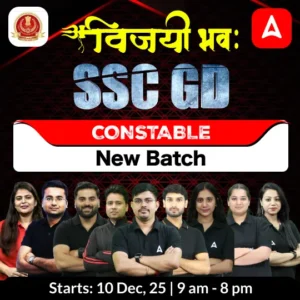Directions (1-15): A sentence has been given in Direct/Indirect form. Out of the four alternatives suggested, select the one which best expresses the same sentence in Indirect/Direct form and mark your answer in the Answer-Sheet.
Q1. He said to the interviewer, “Could you please repeat the question?”
(a) He requested the interviewer if he could please repeat the question.
(b) He requested the interviewer to please repeat the question.
(c) He requested the interviewer to repeat the question.
(d) He requested the interviewer if he could repeat the question.
Q2. He said, “It used to be a lovely, quiet street.”
(a) He said that it used to be a lovely, quiet street.
(b) He pointed out that it had used to be a lovely, quiet street.
(c) He said that there used to be a lovely, quiet street.
(d) He inquired whether there was a lovely, quiet street.
Q3. The Prime Minister said that no one would be allowed to disturb the peace.
(a) The Prime Minister said, “We shall not allow anyone to disturb the peace.”
(b) The Prime Minister said, “We would not allow no one to disturb the peace.”
(c) The Prime Minister said, “No one will disturb the peace.”
(d) The Prime Minister said, “No one can disturb the peace.”
Q4. The spectators said, “Bravo! Well done, players.”
(a) The spectators shouted that the players were doing very well.
(b) The spectators exclaimed with joy that the players were doing very well.
(c) The spectators applauded the players saying that they had done well.
(d) The spectators applauded the players joyfully to do well.
Q5. I said to my friend, “Good Morning. Let us go for a picnic today.”
(a) I told good morning to my friend and asked to go for a picnic that day.
(b) I wished my friend good morning and proposed that we should go for a picnic that day.
(c) I wished my friend good morning and proposed that they should go for a picnic that day.
(d) I told good morning to my friend and suggested to go for a picnic today.
Q6. The new student asked the old one, “Do you know my name?”
(a) The new student asked the old one if he knew his name.
(b) The new student asked the old one that whether he knew his name.
(c) The new student asked the old one did he know his name.
(d) The new student asked the old one if he knows his name.
Q7. I warned her that I could no longer tolerate her coming late.
(a) I said to her, “You can no longer tolerate my coming late.”
(b) I said to her, “I can no longer tolerate your coming late.”
(c) I said to her, “He can no longer tolerate her coming late.”
(d) I said to her, “I can no longer tolerate she coming late.”
Q8. I said to my mother, “I will certainly take you to Bangalore this week.”
(a) I told my mother he would certainly take her to Bangalore that week.
(b) I told my mother that I would certainly take her to Bangalore that week.
(c) I told my mother that she would certainly take her to Bangalore that week.
(d) I told to my mother that I would take you to Bangalore that week.
Q9. “How long does the journey take”, my co-passenger asked me.
(a) My co-passenger asked me how long does the journey take?
(b) I asked my co-passenger how long the journey would take.
(c) My co-passenger wanted to know how long the journey would take.
(d) My co-passenger asked me how long the journey did take.
Q10. “How clever of you to have solved the puzzle so quickly,” said the mother.
(a) The mother exclaimed admiringly that it was very clever of him to have solved the puzzle so quickly.
(b) The mother expressed that he was so clever to have solved the puzzle quickly.
(c) The mother told that he was very clever in solving the puzzle so quickly.
(d) The mother exclaimed with joy that he was clever enough to solve the puzzle so quickly.
Q11. He said he goes for a walk every morning.
(a) He said, “I went for a walk every morning”.
(b) He said, “I go for a walk every morning”.
(c) He said, “I will go for a walk every morning”.
(d) He said, “He goes for a walk every morning”.
Q12. I reiterated, “I don’t care about the job.”
(a) I reiterated I didn’t care about the job.
(b) I said again and again I didn’t care about the job.
(c) I reiterated that I did not care about the job.
(d) I repeatedly said that I cared about the job.
Q13. I said to my brother, “Let us go to some hill station for a change.”
(a) I suggested to my brother that they should go to some hill station for a change.
(b) I suggested to my brother that we should go to some hill station for a change.
(c) I suggested to my brother that let us go to some hill station for a change.
(d) I suggested to my brother that let them go to some hill station for a change.
Q14. I wondered how many discoveries went unheeded.
(a) I said, “How many discoveries have gone unheeded?”
(b) I said, “How many discoveries went unheeded?”
(c) I said, “Do discoveries go unheeded?”
(d) I said, “How many discoveries go unheeded?”
Q15. Gopan said to me, “Can you do these sums for me?”
(a) Gopan asked me if I could do those sums for him.
(b) Gopan asked me if I can do those sums for him.
(c) Gopan asked me if I can do these sums for him.
(d) Gopan asked if I could do these sums for him.
Solutions
S1. Ans.(d)
Sol. Change ‘said to’ into ‘requested’, change reported speech into statement sentence.
S2. Ans.(a)
Sol. We do not change the tense of the reported speech when a true statement is stated, use conjunction ‘that’.
S3. Ans.(a)
Sol. The given sentence is in indirect speech, change it in direct speech.
S4. Ans.(b)
Sol. In the case of exclamatory sentences, use ‘exclaimed with joy’ also change the tense of the reported speech.
S5. Ans.(b)
Sol. Change ‘us’ into ‘we’, and ‘today’ into ‘that day’.
S6. Ans.(a)
Sol. We use ‘if’ in the case of ‘auxiliary verb’, and change the tense of the reported speech into ‘past tense’.
S7. Ans.(b)
Sol. The given sentence is in indirect speech, change it in direct speech. Change ‘her’ into ‘your’.
S8. Ans.(b)
Sol. Change ‘said to’ into ‘told’, ‘you’ into ‘her’, ‘this week’ into ‘that week’.
S9. Ans.(c)
Sol. Write indirect speech in statement form, that means, write subject before the verb.
S10. Ans.(d)
Sol. In the case of exclamatory sentences, use ‘exclaimed with joy’.
S11. Ans.(b)
Sol. The given sentence is in indirect speech, change it in direct speech. We do not change the tense of the reported speech when a true statement/habitual habit is stated,
S12. Ans.(c)
Sol. Use conjunction ‘that’ and change the tense of the reported speech into past tense.
S13. Ans.(b)
Sol. Change ‘said to’ into ‘suggested’, use conjunction ‘that’, and change ‘us’ into ‘we’.
S14. Ans.(d)
Sol. The given sentence is in indirect speech, change it in direct speech
S15. Ans.(a)
Sol. Change ‘said to’ into ‘asked, use ‘if’, write reported speech in statement form, change ‘these’ into those, change pronoun ‘me’ into ‘him’.










